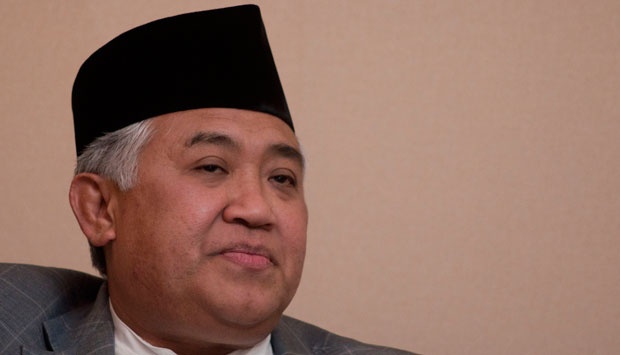Din Syamsuddin: Hardliners from all religions like to wage war
19 October 2018 20:45 WIB

TEMPO.CO, Jakarta - When he found out he could not refuse the mandate to become MUI chairman following the death of Kiai Haji Sahal Mahfudz, Muhammad Sirajuddin Syamsuddin, familiarly known as Din Syamsuddin, recited Bismillah (in the name Allah), Alhamdulillah (Allah be praised) and innalilah (surely we belong to Allah), aware of the heavy responsibility he had to carry. He must now manage issues like fatwa (edict) and the controversial halal (permissible) certificates on food, medicine and cosmetics, which were recently spotlighted by the media.
Din claimed to have initiated reforms on issues like the halal label, although he stressed that it was just accommodating the congregation's need. Last week, he met Tempo reporters Nugroho Dewanto, Bagja Hidayat and Sorta Tobing in his office at the Center for Dialogue and Cooperation among Civilizations, in Central Jakarta.
You once held the position of MUI secretary for about five years. So, you must be quite knowledgable about the halal label certification issue.
In 1995, I was made MUI secretary and 10 years later I was appointed as chairman of Muhammadiyah, so I asked to be excused from MUI activities. But my colleagues wouldn't allow it. So, they made a job for me, vice chairman. In 2010, the MUI convention elected Kyai Sahal Mahfudz as chairman, and said that he wanted me to remain as his deputy, to symbolize the harmony between the Nahdlatul Ulama (NU) and Muhammadiyah. Because the chairman and vice chairman could not be actively involved, we were assisted by 12 deputies.
Perhaps because the chairman and the vice chairman are not active, the Food, Drugs and Cosmetics Supervisory Board (LPPOM) and the Fatwa Commission go their own separate ways?
That's not possible. In both contexts, the chairman is responsible. Fatwas, which may have broad social impact, must be brought to the attention of the council of leaders. So, it doesn't mean the chairman doesn't know about issues, because he is involved and signs the certificates.
What is the MUI's source of authority on the halal label issue?
The MUI's authority is only over the certificates. Labels are not the work of the MUI, the BPOM (Food and Drug Supervisory Board). How did we get the certification authority? It's in Law No. 7/1996 on food. One chapter says: if a halal label is to be affixed on a product, the certificate must be issued by an Islamic institution. The government and the Religious Affairs Ministry agreed that the Islamic institution be the MUI.
So, why have there been so many problems lately?
The MUI is given added authority in this case, and that's to recognize overseas halal certifiers. A halal certifier is not an institution like the MUI, but a company overseas. They are usually owned by Muslims of ethnic Arab, Indian, Pakistani, Bosnian, Iranian and African origins.
Why must the MUI acknowledge their products as halal?
There is a section in the law which says that each foreign company wanting to export their products to us must be certified halal. The MUI is authorized to issue such accreditation. The MUI has a benchmarking or standardization system which, to be honest, are not all approved by the World Halal Council. The MUI initiated the World Halal Council, which has now become the World Halal Food Council.
What are the standards?
There are seven, but I don't remember all of them. Two which I remember are first, he must be a scientist in his field. Second, there must be an Islamic law expert, like the LPPOM and the Fatwa Commission. The MUI recognizes dozens of halal certifiers in Australia. But in fact, there is one which failed the test. The owner is Mohamed El-Mouelhy (president of the Halal Certification Authority, based in Sydney), who was quoted a lot by Tempo. The halal certifier company owned by this Mouelhy was disqualified in 2006, because according to reports, he had no scientist involved in his business, and he had no Islamic law expert, even though he claimed to be one himself because he was Egyptian. But for the MUI, there must be at least two people.
On another matter, have you any objections to conveying Christmas greetings to Christians?
When Idul Fitri comes around I always receive greetings from hundreds of different international leaders. They come from the Vatican, the World Council of Churches, Buddhist associations, Hindus, Shinto and others. So, it would be remiss of me not do the same during their respective holy days. It's all about culture.
Today, as leader of the MUI, will you be consistent and continue to greet Christians on their holy days?
As a matter of principle, one's religiosity shouldn't change because of one's official position, because it's basically a social and cultural issue. So, of course, I will not stop doing it.
Some Catholic groups say they have been able to work closely with the Muhammadiyah under your leadership.
I think that already happened since the era of Pak Syafii Maarif. During the onset of the reform era social relations between different groups became more relaxed. The key words are friendship and mutual acquaintance.
But the problem is there are groups in Islam that often take a hard line. Are they involved in such dialogs?
No. But this is acknowledged as a challenge faced by all religions. There are always groups wanting to do things their own way. They are found in Islam, but also among Christians, Hindus and Buddhists. They like to wage war. So, what often happens is a clash between the fundamentalists. There are about 70 national Islamic mass organizations, two-thirds of them may have branches in all the provinces. But there are even more regional organizations. (*)
Read the full interview in this weeks edition of Tempo English Magazine























